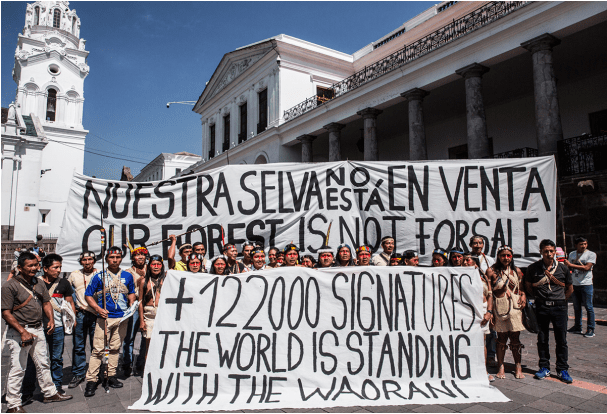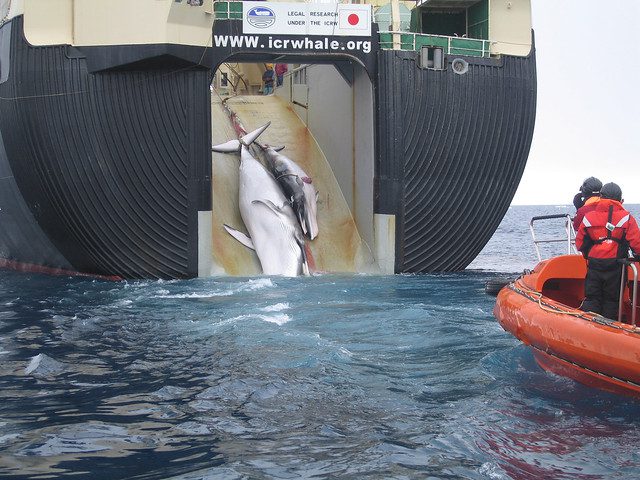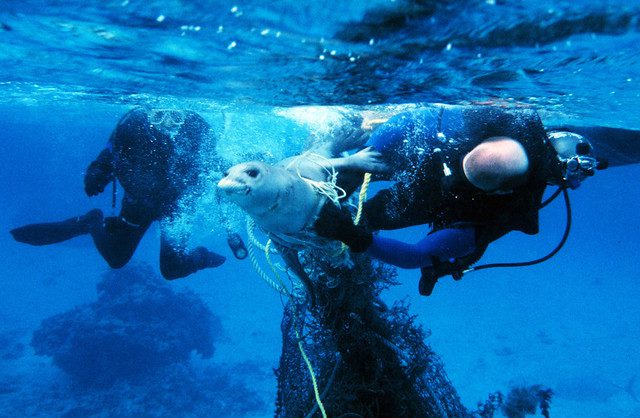


Amazon Frontlines: On April 26, the Waorani people of Ecuador won a historic court ruling protecting half a million acres of their territory in the Amazon rainforest from being earmarked for oil drilling. The ruling voids the consultation process with the Waorani undertaken by the Ecuadorian government in 2012, indefinitely suspending the auctioning of their lands to oil companies. The verdict also disrupts the contemplated auctioning of 16 oil blocks that cover over 7 million acres of indigenous territory, providing an invaluable legal precedent for other indigenous nations fighting to protect their lands from development. But the government’s appeal threatens this historic verdict and the land that it aims to protect.
>>>Tell the Ecuadorian government to respect the court’s ruling and the Waorani’s decision to not sell their land.
Farmworker Justice: Farmworkers and their families are regularly exposed to high levels of pesticides in the fields where they work and in the communities where they live. Their exposure results in thousands of reported pesticide poisonings, illnesses and injuries each year. Unfortunately, farmworkers’ children cannot avoid exposure due to the proximity of their homes, schools and playgrounds to the fields where pesticides are applied, and are exposed to chlorpyrifos through airborne drift, water contamination and residues on their parents’ work clothes. In 2000, the Environmental Protection Agency (EPA) banned the use of the pesticide chlorpyrifos in residential settings because it posed unacceptable risks to young children. But farmworkers and their children across the country are still exposed to chlorpyrifos due to its use on apples, strawberries, broccoli, cherries, corn, almonds, citrus fruit, Christmas trees and other products. The EPA’s double standard on the health of farmworkers and their children must end.
>>>Urge the Environmental Protection Agency and Congress to ban all agricultural uses of the highly toxic pesticide chlorpyrifos.
PETA: Breaking eyewitness footage shows elephants who were forced to participate in the cruel Chitwan Elephant Festival in Nepal being repeatedly struck and gouged with bullhooks—spear-like weapons with a sharp hook on one end—and their ears being violently yanked. Mahouts (handlers) also beat frightened elephants with other weapons, such as sticks and makeshift wooden knives. One mahout can be seen repeatedly jabbing a baby elephant behind the ear to force her to “play” football. Right after the match, eyewitnesses saw that she was suffering from several fresh, painful and bloody wounds. Since hearing from activists, Renault, MINISO, Carlsberg Group, United Beverage, Kumari Bank, Mega Bank, JGI, Chaudhary Group, Everest Insurance and Hotel Seven Star have cut ties with the event. However, Mount Everest Group and NRNA, which sponsored or advertised at the festival last year, have no plans to stop supporting it.
>>>Tell Mount Everest Group and NRNA to stop supporting the cruel Chitwan Elephant Festival.
Cause for concern…

- Japan resumes commercial whaling after 30 years (BBC News)
- Greenland’s ice sheet is melting unusually fast, may raise sea level by an extra millimeter this year (The Economist)
- Newborn Hawaii beach is already polluted with tiny pieces of plastic (Sarah Gibbens, National Geographic)
- The climate crisis is now cooking mussels in their shells (Olivia Rosane, EcoWatch)
- Scientists call octopus farming an ethical and environmental disaster (Calen Otto, Free From Harm)
Round of applause…

- Environmentalists retrieved 40 tons of abandoned fishing nets from the Great Pacific Garbage Patch (Olga R. Rodriguez, TIME)
- Turkey’s third largest city has officially banned horse-drawn carriages (Daily Sabah)
- Puffy unicorn stickers could save millions of migrating birds each year (Jessica Boddy, Popular Science)
- Bestie’s Vegan Paradise is the vegan answer to 7-Eleven (Foodbeast/Taste of Home)
- From skincare to makeup cleaning products, here’s the 2019 list of officially cruelty-free brands (Cruelty-Free Kitty)
Parting thought…
“I find it abhorrent to see a whale being slaughtered and do nothing but bear witness.” —Paul Watson